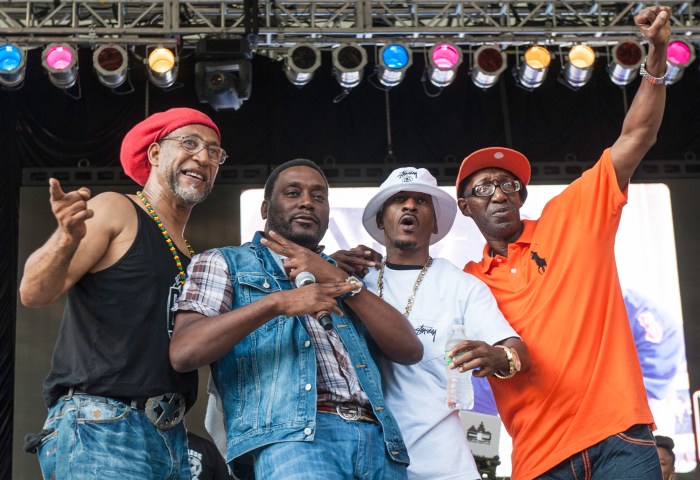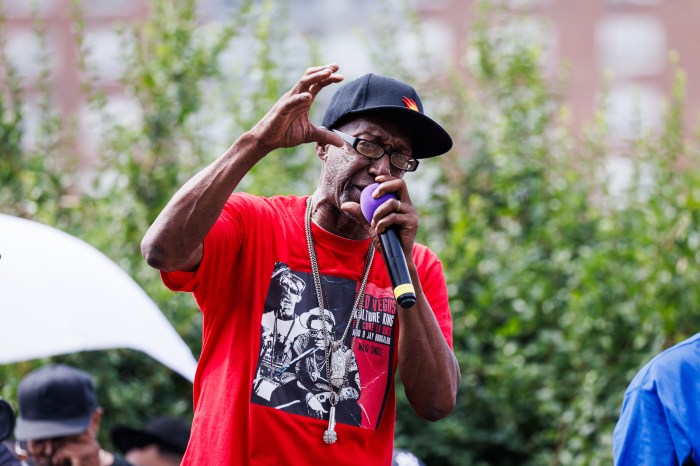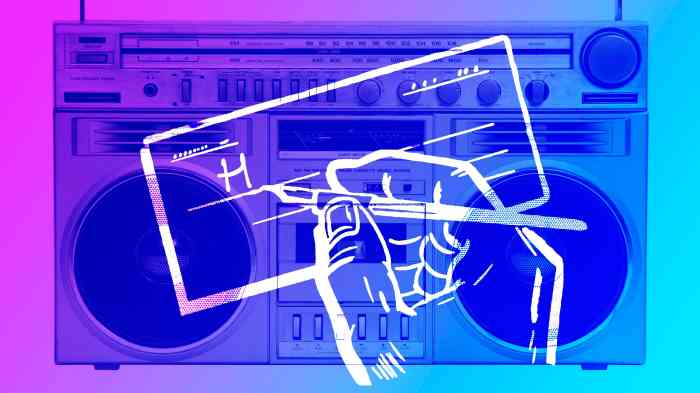When it all began, Coke La Rock was on the microphone. As DJ Kool Herc played his revolutionary mix of breakbeats on Aug. 11, 1973, Coke La Rock talked over the music, shouting out friends and bragging about money and cars. In those moments when beats met words and made bodies move in the rec room at 1520 Sedgwick Ave. in the Bronx, hip-hop was born.
Fifty years later, hip-hop has generated billions of dollars. Coke La Rock, meanwhile, is preparing to retire from his job as a building superintendent in the Bronx, New York, where he still resides. He’s not living in poverty, but he also has enjoyed very few fruits from the seeds that he planted.
“If you name Kool Herc to be the father of hip-hop, then I have to be the first emcee of hip-hop, because I came out the same recreation room,” Coke La Rock, who is 68 years old, told me.
What does the business of hip-hop owe pioneers like Coke La Rock?
He only appeared on one record, DJ Kay Slay’s “Rolling 110 Deep” in 2021, so Coke La Rock and many of his contemporaries don’t have a claim to the $2.8 billion in 2022 global hip-hop music sales. Coke La Rock wore Adidas pants to the party where hip-hop was born, which played a foundational role in hip-hop adopting Adidas as its own and increasing the brand’s popularity – but last year Coke La Rock got not a penny of the sportswear giant’s $24 billion in sales. The attorneys working for Universal Music or Spotify or Apple could say that legally, they don’t owe pioneers like Coke La Rock a thing.
But if we really care about hip-hop, things look different. The hip-hop DNA in music, movies, TV shows, sneakers and clothing continues to generate billions upon billions of dollars. So it would only be right to finally to not only give respect but also remuneration to pioneers who created this life-changing culture.
Rap-arations, yo. Fifty years later, it’s time.
If we truly love the culture, let’s show more love to the people who built it and never reaped the full rewards.
“People love to use that quote, ‘I’m doin’ it for the culture,’ ” Kay Slay said on the intro to “Rolling 110 Deep.” “But what culture is that that you’re talking about? / The one that you claim as a hip-hop artist / but won’t do the research on hip-hop history / Or the one where you disrespect, disconnect / and disregard the founding fathers?”
Coke La Rock said that while he has heard talk for years about paying the OGs their due, Kay Slay, who died in 2022, is one of the few people in hip-hop who consistently gave him work. Coke La Rock isn’t begging or trying to force the issue. But when I called him to talk about the idea, his frustration was evident.

Jack Vartoogian/Getty Images
“Everybody that got this money, all they care about is they money. They say, ‘Thanks to the OGs,’ but thank you ain’t paying no bills. Come on. And it’s there! The money’s there. I didn’t name a figure. You dig what I’m saying? But come on. I mean, anything, man. If everybody that did hip-hop put a dollar away, you know I’d be a millionaire.”
That dollar could be considered a type of royalty payment for pioneers? “Yeah, like a royalty,” Coke La Rock said. “A royalty on the culture itself.”
That said, the concept of compensating rap pioneers who built the culture is challenging.
When I called Dan Charnas, author of The Big Payback: The History of the Business of Hip-Hop, the authoritative history of the rap music business, he observed that many Black artists before hip-hop got robbed by the industry, whether through predatory contracts or the segregation that kept most Black artists off the pop charts. Hip-hop, Charnas said, actually represents “an unprecedented instance of Black artists and entrepreneurs seizing more equity and access than they ever had historically.”
Charnas suggested that justice would be better served by building a racketeering case against record companies and radio stations that conspired to violate the civil rights of Black artists by denying them equal opportunity to mainstream success. “Hip-hop burst through those doors,” he said.
True that. I support any artist seeking compensation for being victimized by the notoriously deceitful music industry. The Black musicians who created the blues, jazz and rock also missed their opportunity to capitalize on the most lucrative years of those genres. But many hip-hop pioneers are still here. The industries that profit today because of the pioneers’ innovations can still do right by them.
Hip-hop was the right art form, at the right historical moment of Black opportunity, to explode into the most lucrative expression of Black culture the world has ever seen. And the creators who made that possible missed out.
Another problem is a lack of visible support among younger hip-hop artists making millions. Not that today’s stars should pay a portion of their earnings to the OGs. But other than a few scattered efforts like the recent Grandmaster Awards, they haven’t seemed interested in creating opportunities for pioneers or pressuring the music industry to help in a substantial way.
“Many of these younger artists, they take the position that why should I be concerned about these old guys now that I’m getting paid,” said veteran hip-hop industry attorney Ian Waldon. “Not all of them, but many of them have a very interesting perspective on what got them there and that they, quote, don’t owe anything to the people who opened the doors and got the culture to the point where they could have a touring career or actually make money from selling records. But there’s no reflection on what it took to get to this point.”
Waldon said that many hip-hop artists from the 1970s and early 1980s may have recorded only a single or two, if any, because there was no market then for rap. And when they did start getting record deals, most of the contracts were set up to saddle artists with the costs of making the records, so they never earned any money after the up-front advance.

Richard Bord/Getty Images
Waldon suggested that record companies should forgive all past expenses that were unfairly charged to rap artists from the 1980s, 1990s and early 2000s – “zero out” their accounts – so they can finally earn royalties from streaming. There’s no reason those artists should continue to pay for things like extravagant videos they did not ask to be shot, or payola to radio stations they did not know about. “Multibillion-dollar music corporations were built on the backs of many of these artists,” Waldon said. “The record companies have made back the money they put into them ten, twenty, thirty-fold. The moral argument can definitely be made for early artists to finally get some money.”
Then there’s the issue of Black people now holding positions of influence in the music industry – they can help make some form of rap-arations happen. Of the 16 Black billionaires recognized by Forbes, two came from hip-hop (I count Rihanna because her career was made by Def Jam). Today’s industry executives earned their spots through their own talent and hard work, and Jay-Z and Rihanna now make most of their money outside of music. But their careers are only possible because of hip-hop.
Payments for hip-hop pioneers isn’t the same as the movement for reparations for Black Americans harmed by slavery and racial discrimination, which has recently grown from a fringe idea to serious consideration and even reality in some places. Reparations seeks compensation from local, state and federal governments that enacted racist policies, which means payments come from tax revenues or other public funding sources.
Rap-arations, in my opinion, should come from the profits of corporations that make money from hip-hop, such as Apple Music, which had $8 billion in 2022 revenue, or Spotify, which made $12 billion, or Nike and its $51 billion. If they helped the artists who made so much of their business possible, it would barely dent their bottom line.
I hear some rumbling that Nike already donates plenty of money to the ’hood. Look, Nike would not be Nike without hip-hop. We created sneaker culture through our fusion of basketball and music expression. Hip-hop stamped NBA legend Michael Jordan’s kicks as dope. Hip-hop is the reason people buy dozens upon dozens of pairs of kicks. Nike has been good to the culture, for sure. But in my opinion, Nike can never repay hip-hop enough.
So here’s a suggestion, Phil Knight: appoint a committee of director Spike Lee, rapper KRS-One and NBA great LeBron James to distribute $1 million per year, in sums of at least $25,000, to rappers who meet the following criteria: 1) They made a record name-dropping Nike. 2) Their income from music is less than $25,000 per year. 3) Their Nike record is at least 20 years old.
Last month, a new organization called the Paid in Full Foundation held an awards ceremony and announced its intention to pay hip-hop pioneers – “to financially enable great artists to continue to bless us with their art,” said foundation co-founder and tech billionaire Ben Horowitz, who is on the group’s board of directors along with hip-hop industry veteran Steve Stoute.
When I first read about plans for this event, it seemed like something close to rap-arations. But after it went down, I saw that the first two Grandmaster Awards went to the legendary rappers Rakim and Scarface, who will receive grants of $100,000 per year after taxes for the next five years. “In the future, the foundation also aims to provide help to artists who have acute medical conditions or other hardships, but we have not yet developed that program,” Horowitz said. Rakim and Scarface made everlasting contributions to the culture and absolutely deserve their flowers, but I think it would have been better if the foundation took that million dollars and spread it among pioneers who made way less money in their careers than Ra and ‘Face.
Maybe the foundation will help lesser-known artists such as DJ Hollywood, or Toddy Tee, or Sha-Rock, or Fabel, or the family of the late great Phase 2. There could be an income ceiling to qualify for payments. Maybe rap-arations could change some lives, not only with money, but with acknowledgement and respect.
“I’m 68, man,” Coke La Rock said. “In the last 10 years, I had to force people to understand that I wasn’t a myth.-
“I don’t like that feeling where I’m out here, like I’m begging people to understand who I am and whatever, like I got a cup in my hand. But I know for a fact that what came out of me and Herc became hip-hop.”
This post was originally published on this site be sure to check out more of their content.







